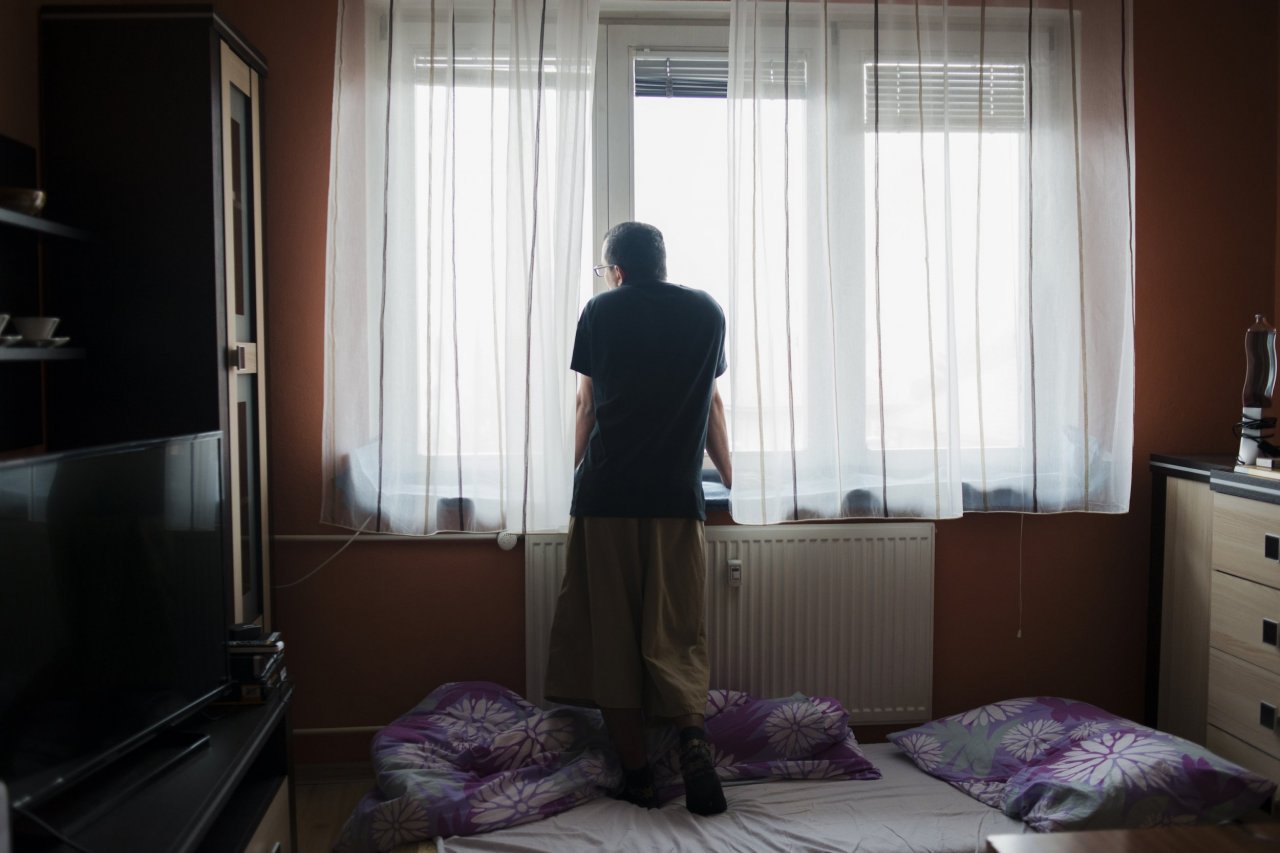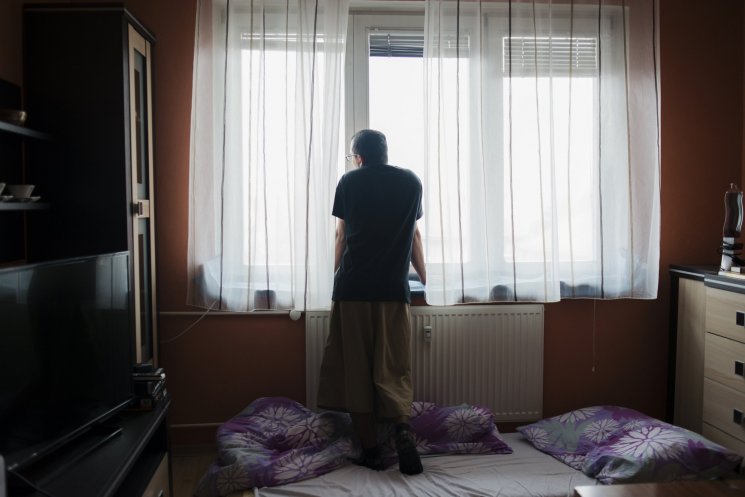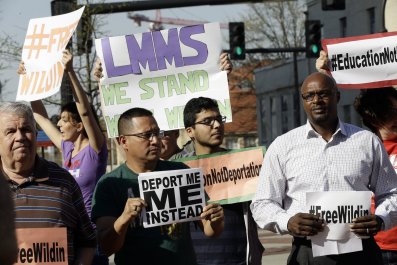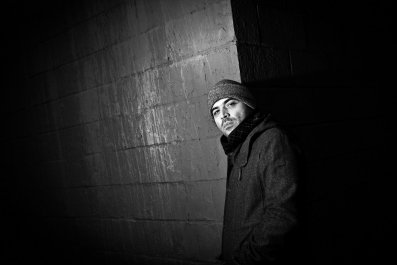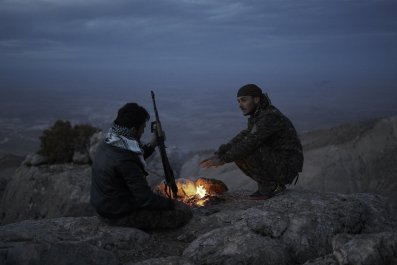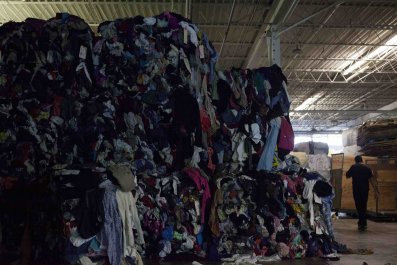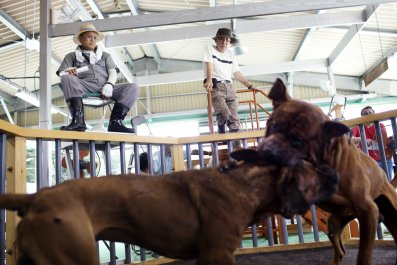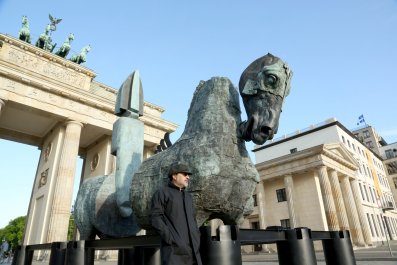It's early Sunday morning, and the streets of Zvolen are empty. Most in this midsize town in Slovakia are attending church, while others battle hangovers from the previous night. Hussein al-Merfedy has a bad headache too, but it's a migraine, not something alcohol-related. He's a Muslim and former detainee at the U.S. prison at Guantánamo Bay, Cuba.
Two years ago, al-Merfedy was one of dozens of detainees the U.S. kept locked up at Gitmo, even though they were never charged with a crime. Though he had been cleared for release in 2008, he spent more than a decade in prison without explanation. That changed on November 14, 2014, when the military handcuffed and blindfolded al-Merfedy and put him on a plane. When he landed, however, he was not home in Yemen; he was thousands of miles away in Slovakia, a stranger in a new country.
Al-Merfedy pulls himself out of bed and trudges toward the bathroom, his baggy beige pajama pants hanging low on his hips. He received these pants at Gitmo and still wears them around the house. It's a habit, he says, that's hard to change. Standing in front of the mirror, he runs his hands through his hair; until a month ago, it fell past his shoulders. Now it's cropped short, "so I could fit in. So people don't stare at me so much."
Soon al-Merfedy makes his way to the kitchen. It looks almost new: a few dishes are stacked neatly in the drying rack, the countertops are spotless, and the fridge is nearly empty. The apartment is silent, save for the ticking of a clock and the chirping of his pet finch, which sits in a cage. Al-Merfedy has few visitors. His only friends are his caseworkers and a handful of Gitmo detainees who live elsewhere in town. Today will be just like any other for him. There is nothing to do, no one to see.
"I am almost 40 years old," he says. "I imagined having a family and children one day. But here I am, still alone."
'Islam Has No Place in Slovakia'
Over the past two years, the Obama administration has renewed its push to close Gitmo and release detainees it no longer deems a threat. Of the roughly 780 original prisoners, 61 remain behind bars, 20 of whom are cleared for release. But detainees from war-torn countries like Yemen, Libya and Syria cannot return home; the U.S. government fears they might join or rejoin extremist groups.
Instead, the Defense Department has released 55 former detainees to Gulf states rather than their home nations. But these countries will take only so many men, so others were forced to go to Kazakhstan and Slovakia, where they've struggled to adjust. "The idea seemed to be to get them out of Guantánamo at almost any cost," says David Remes, a lawyer to many present and former detainees, including al-Merfedy. "They were dropped into strange lands, with cultures, religions and language far different from their own, and where they were bound to be treated like pariahs."
Adapting to life in Slovakia has been difficult for al-Merfedy. In his new town, aside from four other former Guantánamo detainees, the only other Muslim he knows is a Turkish man who owns a kebab shop. He sometimes goes to Martin, a city about two hours away where a small group of Muslims hold Friday prayers in the back of a coffee shop. (Slovakia is the only EU member state without a real mosque.) "The people here are maskeen," al-Merfedy says, using the Yemeni word for "kind" or "good-hearted." "The problem is with the government."
The refugee crisis that began in 2015 brought hundreds of thousands of Muslims from the Middle East to Europe. That brought a backlash over fears the newcomers will compete for jobs and resort to terrorism. "Islam," the country's prime minister, Robert Fico, recently told a Slovak news agency, "has no place in Slovakia."
Men like al-Merfedy are seemingly stuck in limbo, neither behind bars nor completely free. They are not banned from working, but no one will hire them; they want to marry, but Muslim women are scarce; they long to reunite with their families, but more than a year after release, they are still alone. "Each day, I walk through Tbilisi," says Salah al-Dhaby, a Yemeni former detainee who was transferred to Georgia. "I live a silent life, wandering the streets, then going back to a silent apartment."
That silence, al-Merfedy says, feels like a cage. "We thought we would be free when we left Guantánamo," he says. "Instead, we went from the small Guantánamo to here—a bigger Guantánamo."
Sold to the Afghans
Al-Merfedy's troubles began when he traveled from Yemen to Pakistan to look for work in 2001. After connecting with an Islamic missionary organization, he decided to travel to Europe to find work. Yet in the wake of 9/11, visas for Yemenis, even those registered with legitimate organizations, were difficult to obtain. Al-Merfedy was undeterred. He paid someone to
smuggle him across Pakistan and Afghanistan, through Iran and into Turkey, where he hoped to find a way to Europe. He was captured in Iran, accused of being an Al-Qaeda recruiter and sold to Afghan authorities. The Afghans sent him to the Americans, who then transferred him to Guantánamo on May 9, 2003. His missionary group, the U.S. believes, was often used a front for extremists.
For five years, al-Merfedy remained behind bars, maintaining his innocence. His attorney points out that local groups often exploited lucrative American bounties for those connected to Al-Qaeda and sometimes delivered innocent men. Others seemed to be marginal players in the war on terror. "Few 'combatants' are even accused of having fought," according to a 2006 report by Human Rights Watch. "Many are held simply because they were living in a house associated with the Taliban or working for a charity linked to the group."
Whether al-Merfedy is innocent remains unclear; the Defense Department and the State Department's Special Envoy for Guantánamo Closure do not discuss the details of individual cases. But the U.S. cleared him for release in 2008, no longer deeming him a threat. After American intelligence officials discovered that Umar Farouk Abdulmutallab (the "Underwear Bomber") was trained in Yemen, however, the U.S. refused to transfer al-Merfedy or any of his countrymen back there. " The decision to transfer a detainee is made only after detailed, specific conversations with the receiving country about the potential threat a detainee may pose after transfer and the measures the receiving country will take in order to sufficiently mitigate that threat, and to ensure humane treatment,"says Lt. Col Valerie Henderson, a Defense Department spokesperson.
Some six years later, after more than a decade of intermittent "enhanced interrogations," hunger strikes and solitary confinement, he was called into an office at Gitmo. There he met liaisons from Slovakia, who promised him a new life, and al-Merfedy was excited. "I wanted to leave Guantánamo," he says.
Now that he is free, al-Merfedy is part of a two-year program run by the International Organization for Migration to make him feel more comfortable. This includes paid housing and a monthly stipend, Slovak language teachers, a psychologist and a social worker. Yet, so far, al-Merfedy has struggled to find a job and is worried what will happen next year, when the IOM cuts his stipend in half. The group says it would consider an extension, but only if it can prove to the government he is learning Slovak. Al-Merfedy says he is trying, but his classes are in English, a language he doesn't speak well, which makes the learning process slow. He knows the basic greetings: dobry den ( good morning), prosim (please) and dakujem (thank you). He can pass for a tourist, but nothing more.
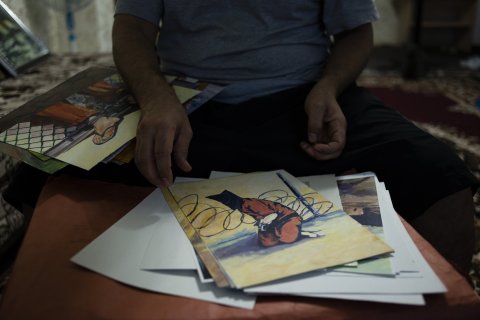
Who'd Marry an Ex-Gitmo Man?
Around lunchtime, al-Merfedy strolls into town, gazing at the ground, occasionally looking up and smiling as he sees young couples holding hands or fathers playing with their children. Some pass him with a slight smile. Others eye him with suspicion or curiosity.
The 39-year-old had a large family back in Yemen and would like to see them again. But al-Merfedy is a permanent resident alien, not a refugee or an asylum seeker, so Slovakia is not legally obligated to reunite him with his mother, sisters or brothers. He wants to raise a family, but in a country with few Muslims and fewer who would marry a former Gitmo detainee, his prospects are bleak. According to Pooja Jhunjhunwala, a spokesperson for the State Department, "We support family reunification because we believe it leads to successful outcomes, successful integration." However, the receiving countries actions do not always match State Department views.
Hussein is still waiting for the government to approve a visa allowing his family to visit. "Maybe if I was with my family, it would be OK," he says, "but...I am a stranger. I am in exile. I have been longing for things my whole life, but they have all been decided for me."
Later that day, as the sunlight fades, so too does Hussein's headache, and by the time fog descends onto the streets, he feels better. He walks the solitary mile to his apartment, taking backstreets to avoid revelers spilling out of local bars. When he arrives, the sun is setting over Zvolen, and al-Merfedy pulls down his shades.
Once again, his apartment is silent, save for the ticking of the clock and the sound of the finch singing its evening song. "I hate to see anything in a cage," he says as he fills the bird's water and food containers. "I was in a cage my whole life."
He pulls out a thin blanket and places it gently over the cage. After a moment, the bird goes silent.
This piece was produced with the support of the IWMF Howard G. Buffet Fund for Women Journalists



